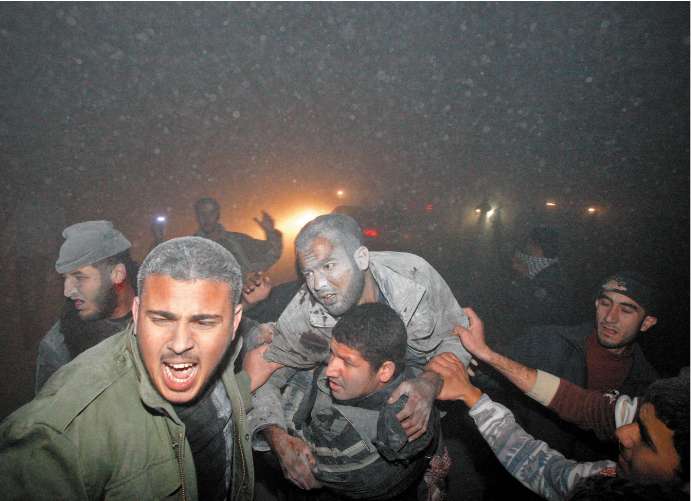Israel's warning: rocket fire from Gaza will result in a Palestinian 'holocaust'

Your support helps us to tell the story
From reproductive rights to climate change to Big Tech, The Independent is on the ground when the story is developing. Whether it's investigating the financials of Elon Musk's pro-Trump PAC or producing our latest documentary, 'The A Word', which shines a light on the American women fighting for reproductive rights, we know how important it is to parse out the facts from the messaging.
At such a critical moment in US history, we need reporters on the ground. Your donation allows us to keep sending journalists to speak to both sides of the story.
The Independent is trusted by Americans across the entire political spectrum. And unlike many other quality news outlets, we choose not to lock Americans out of our reporting and analysis with paywalls. We believe quality journalism should be available to everyone, paid for by those who can afford it.
Your support makes all the difference.An Israeli government minister warned yesterday that increasing rocket fire from Gaza would bring Palestinians a Shoah – the Hebrew word normally used to denote the Nazi Holocaust inflicted on Jews during the Second World War.
The declaration by the Deputy Defence Minister, Matan Vilnai, came amid fresh calls from some Israeli politicians for a ground invasion of Gaza provoked by the launch of eight Soviet-designed Grad rockets into the southern city of Ashkelon during the lethal violence of the past three days.
Mr Vilnai declared: "As the rocket fire grows, and the range increases – and they haven't yet said the last word on this – they are bringing upon themselves a greater Shoah because we will use all our strength in every way we deem appropriate, whether in air strikes or on the ground."
The former Labour minister and general in the IDF military told Army Radio: "We're getting close to using our full strength."
Government spokesmen launched an immediate damage limitation exercise saying that Mr Vilnai was merely using the word to mean "disaster" and not in any way intending to convey the idea of genocide. But Shoah is rarely used in modern Hebrew parlance for events other than the Holocaust.
The Israeli air strikes have killed at least 33 people, including five children, in the past two days. The strikes were launched in response to the barrage of Qassam rockets launched from Gaza, one of which killed an Israeli mature student in the southern town of Sderot on Wednesday.
The rocket attacks themselves followed the killing of five key Hamas militants in the southern Gaza town of Khan Younis earlier that day.
One girl, aged 17, was injured by the more powerful, longer-range rockets fired at Ashkelon, a city of 120,000 people situated 11 miles north of Gaza. Another missile went through the roof of an apartment building and landed three floors below. Palestinian militants have not used them in such quantities before.
Arye Mekel, spokesman for the Israeli Foreign Ministry, reinforcing comments made by Mr Vilnai's own spokesman, added: "Matan Vilnai used the Hebrew phrase that included the term Shoah in the sense of a disaster or a catastrophe, and not in the sense of a holocaust."
But Hamas was quick to seize on the minister's remark. A spokesman, Sami Abu Zuhri, said: "We are facing new Nazis who want to kill and burn the Palestinian people."
One man was slightly wounded by a rocket attack on Sderot yesterday – one of 16 which the military said had been fired during the day. Palestinian sources in Gaza said that five people – including two children – had been wounded in three air strikes in the northern Strip yesterday.
Tony Blair, envoy for the Middle East international Quartet, while "utterly condemning" the rocket attacks from Gaza, said last night: "It is vital that in action against them, everything possible is done to avoid the loss of innocent Palestinian life, so that there are not even more victims of the situation created in Gaza."
The Israeli Prime Minister, Ehud Olmert, is thought to be very wary of authorising a major ground offensive in Gaza. But Tzachi Hanegbi, chairman of the Knesset foreign affairs and defence committee and a hawkish member of Mr Olmert's ruling Kadima party, said yesterday: "The State of Israel must make a strategic decision to order the IDF to prepare quickly to topple the Hamas terror regime and take over all the areas from which rockets are fired on Israel." He said the IDF should prepare to remain in those areas for years if necessary.
Yossi Beilin, the former minister and ex-leader of the left of centre Meretz Party, said that a diplomatic rather than military solution was needed.
He said that Hamas had at least twice made requests "via a third party" to agree a truce. He added: "My solution is to reach a ceasefire with Hamas."
A Haaretz-Dialog poll this week showed that 64 per cent of Israelis were in favour of such an agreement to end the rocket fire, and secure the release of the Israeli corporal, Gilad Shalit, who was abducted by Gaza militants in June 2006.
On a visit to Ashkelon, however, the Defence Minister, Ehud Barak, gave little sign that the government was contemplating such a course. "Hamas is directly responsible for the current situation and will be the one to bear the cost of our response. An Israeli response is necessary and will be carried out," he said.
Ismail Haniyeh, the de facto Hamas prime minister in Gaza, speaking at a mosque near his home in his first public appearance for a month, said: "What does a large-scale raid mean? You [Israelis] were in the Gaza Strip and you quit because of the resistance."
Join our commenting forum
Join thought-provoking conversations, follow other Independent readers and see their replies
Comments